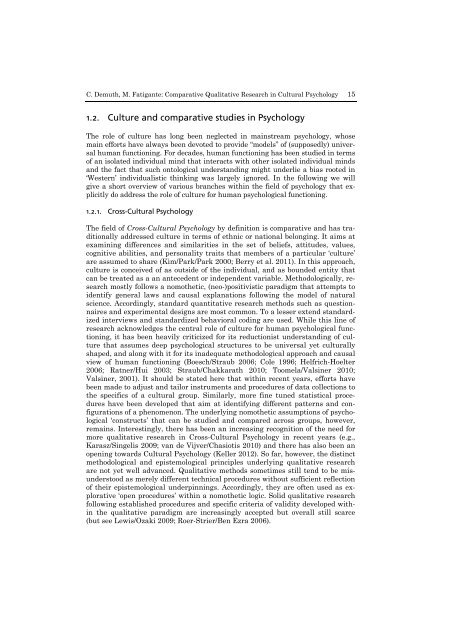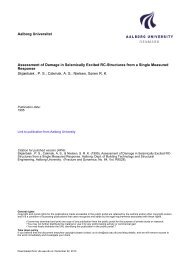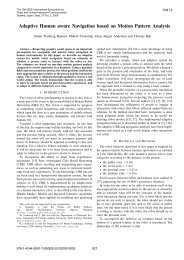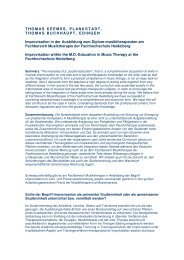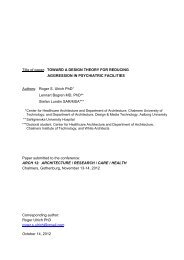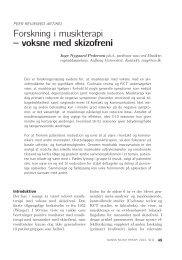Comparative qualitative research in Cultural Psychology - VBN
Comparative qualitative research in Cultural Psychology - VBN
Comparative qualitative research in Cultural Psychology - VBN
Create successful ePaper yourself
Turn your PDF publications into a flip-book with our unique Google optimized e-Paper software.
C. Demuth, M. Fatigante: <strong>Comparative</strong> Qualitative Research <strong>in</strong> <strong>Cultural</strong> <strong>Psychology</strong> 15<br />
1.2. Culture and comparative studies <strong>in</strong> <strong>Psychology</strong><br />
The role of culture has long been neglected <strong>in</strong> ma<strong>in</strong>stream psychology, whose<br />
ma<strong>in</strong> efforts have always been devoted to provide “models” of (supposedly) universal<br />
human function<strong>in</strong>g. For decades, human function<strong>in</strong>g has been studied <strong>in</strong> terms<br />
of an isolated <strong>in</strong>dividual m<strong>in</strong>d that <strong>in</strong>teracts with other isolated <strong>in</strong>dividual m<strong>in</strong>ds<br />
and the fact that such ontological understand<strong>in</strong>g might underlie a bias rooted <strong>in</strong><br />
‘Western’ <strong>in</strong>dividualistic th<strong>in</strong>k<strong>in</strong>g was largely ignored. In the follow<strong>in</strong>g we will<br />
give a short overview of various branches with<strong>in</strong> the field of psychology that explicitly<br />
do address the role of culture for human psychological function<strong>in</strong>g.<br />
1.2.1. Cross-<strong>Cultural</strong> <strong>Psychology</strong><br />
The field of Cross-<strong>Cultural</strong> <strong>Psychology</strong> by def<strong>in</strong>ition is comparative and has traditionally<br />
addressed culture <strong>in</strong> terms of ethnic or national belong<strong>in</strong>g. It aims at<br />
exam<strong>in</strong><strong>in</strong>g differences and similarities <strong>in</strong> the set of beliefs, attitudes, values,<br />
cognitive abilities, and personality traits that members of a particular ‘culture’<br />
are assumed to share (Kim/Park/Park 2000; Berry et al. 2011). In this approach,<br />
culture is conceived of as outside of the <strong>in</strong>dividual, and as bounded entity that<br />
can be treated as a an antecedent or <strong>in</strong>dependent variable. Methodologically, <strong>research</strong><br />
mostly follows a nomothetic, (neo-)positivistic paradigm that attempts to<br />
identify general laws and causal explanations follow<strong>in</strong>g the model of natural<br />
science. Accord<strong>in</strong>gly, standard quantitative <strong>research</strong> methods such as questionnaires<br />
and experimental designs are most common. To a lesser extend standardized<br />
<strong>in</strong>terviews and standardized behavioral cod<strong>in</strong>g are used. While this l<strong>in</strong>e of<br />
<strong>research</strong> acknowledges the central role of culture for human psychological function<strong>in</strong>g,<br />
it has been heavily criticized for its reductionist understand<strong>in</strong>g of culture<br />
that assumes deep psychological structures to be universal yet culturally<br />
shaped, and along with it for its <strong>in</strong>adequate methodological approach and causal<br />
view of human function<strong>in</strong>g (Boesch/Straub 2006; Cole 1996; Helfrich-Hoelter<br />
2006; Ratner/Hui 2003; Straub/Chakkarath 2010; Toomela/Vals<strong>in</strong>er 2010;<br />
Vals<strong>in</strong>er, 2001). It should be stated here that with<strong>in</strong> recent years, efforts have<br />
been made to adjust and tailor <strong>in</strong>struments and procedures of data collections to<br />
the specifics of a cultural group. Similarly, more f<strong>in</strong>e tuned statistical procedures<br />
have been developed that aim at identify<strong>in</strong>g different patterns and configurations<br />
of a phenomenon. The underly<strong>in</strong>g nomothetic assumptions of psychological<br />
‘constructs’ that can be studied and compared across groups, however,<br />
rema<strong>in</strong>s. Interest<strong>in</strong>gly, there has been an <strong>in</strong>creas<strong>in</strong>g recognition of the need for<br />
more <strong>qualitative</strong> <strong>research</strong> <strong>in</strong> Cross-<strong>Cultural</strong> <strong>Psychology</strong> <strong>in</strong> recent years (e.g.,<br />
Karasz/S<strong>in</strong>gelis 2009; van de Vijver/Chasiotis 2010) and there has also been an<br />
open<strong>in</strong>g towards <strong>Cultural</strong> <strong>Psychology</strong> (Keller 2012). So far, however, the dist<strong>in</strong>ct<br />
methodological and epistemological pr<strong>in</strong>ciples underly<strong>in</strong>g <strong>qualitative</strong> <strong>research</strong><br />
are not yet well advanced. Qualitative methods sometimes still tend to be misunderstood<br />
as merely different technical procedures without sufficient reflection<br />
of their epistemological underp<strong>in</strong>n<strong>in</strong>gs. Accord<strong>in</strong>gly, they are often used as explorative<br />
‘open procedures’ with<strong>in</strong> a nomothetic logic. Solid <strong>qualitative</strong> <strong>research</strong><br />
follow<strong>in</strong>g established procedures and specific criteria of validity developed with<strong>in</strong><br />
the <strong>qualitative</strong> paradigm are <strong>in</strong>creas<strong>in</strong>gly accepted but overall still scarce<br />
(but see Lewis/Ozaki 2009; Roer-Strier/Ben Ezra 2006).


